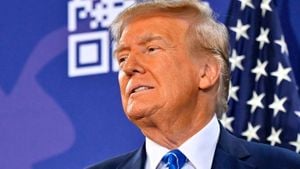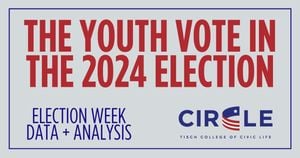The prospect of Donald Trump's return to the White House raises significant questions about the future of U.S. debt and its complicated relationship with China. Financial experts and analysts are voicing concerns about the potential impact of Trump’s policies on the nation’s fiscal health, indicating it could lead to unsustainable levels of debt as early as the end of 2025.
According to Rick Rieder, head of global fixed income at BlackRock, Trump’s policies might pile on as much as $10 trillion to the U.S. debt over the following decade. This looming increase would exacerbate the already troubling national debt, which recently hit $35.95 trillion. With interest rates rising, the government is expected to spend approximately $658 billion on interest alone by the end of the year, consuming significant discretionary spending and limiting the government’s fiscal flexibility.
Rieder pointed out these financial strains could soon lead to investors doubting the U.S. government's ability to manage its debt effectively—a scenario he describes as the most pressing issue of Trump's potential second term. He metaphorically noted, "markets tend to react to the shark closest to the boat" and warned against complacency about the dynamics of U.S. debt.
The situation is worsened by the fact China, once one of the largest buyers of U.S. debt, has been pulling back its investments. Alongside Japan, which also shows signs of reduced interest, this shift indicates rising concerns surrounding the sustainability of U.S. fiscal policies.
Turning to his foreign policy stance, Trump's previous administration brought about significant tension between the U.S. and China. Analysts noted his mix of tariffs, sanctions, and unpredictability shifted the U.S. strategy toward China from passive to aggressive. Trump's actions unsettled Beijing, which during the Biden administration had adopted a somewhat defiant tone. The recent election has prompted Chinese leaders to shift to more conciliatory expressions, seeking peaceful coexistence now rather than confrontation with the U.S.
China finds itself on shaky ground economically; growing debt, record-high youth unemployment, and the challenges of managing its aging population paint a dire picture. Trump's assertive approach could strike at these already vulnerable points. For the first time, China would contend with the possibility of heightened tariffs on exports, significantly affecting its economy. Some projections suggest tariffs reaching as high as 200 percent could follow any aggressive actions from Beijing, particularly concerning Taiwan.
Many believe this economic pressure may lead to broader ceiling effects on China's growth. Trump's advisors hint at intensifying control over U.S. investments and tightening export restrictions on technology and manufacturing sectors, signaling he views China’s development as harmful to U.S. national interests.
Mr. Xi Jinping’s leadership has led to troubling policy initiatives, culminating in mismanagement on several fronts, including economic growth strategies based on state subsidy and manufacturing exports. Analysts indicate this model is beginning to show signs of strain, raising questions about its sustainability. With Xi emphasizing party control over business, confidence among entrepreneurs has plummeted, leading to capital flight and diminished foreign investments.
Trump not only forecasts aggressive economic tactics against China but has also suggested leveraging the U.S. global financial standing as part of his strategy. The possibility of redirecting U.S. power to deny China the leeway it needs is on the table. His emphasis on military strength and alliances has intensified, asserting the need for fair burdens among allies rather than overly punitive tariffs.
This strategic framework is pivotal as the U.S. competes with China for dominance over next-generation technologies, including semiconductors and artificial intelligence. Failure to maintain this edge could mean allowing China to reshape global power dynamics. The stakes couldn’t be higher as America looks to navigate the tightrope of economic prowess and political stability against China's faltering growth.
Moving forward, experts argue, it is imperative for the U.S. to approach this rivalry not just from a position of pressure but also through strengthening internal policies—an “America First” vision. The balance of power must not merely settle on tariffs but also include fostering economic stability amid potential disruptions from financial sanctions or retaliatory tariffs from China.
For Trump, winning this round against China means embracing boldness behind solid strategies, ensuring domestic renewal and maintaining alliances. His potential to reshape U.S.-China relations hinges on recognizing China’s current vulnerabilities and engaging effectively with international partners to pivot the balance of power favorably for America.
Whether more fiscal strain under Trump’s administration will complicate these international affairs is yet to be determined, but the interplay between U.S. debt levels and global influence is clearer than ever. Economic strategies may well dictate the bilateral dynamics and financial realities facing both nations as they navigate this treacherous terrain.



